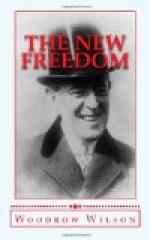The “protective” policy, as we hear it proclaimed to-day, bears no relation to the original doctrine enunciated by Webster and Clay. The “infant industries,” which those statesmen desired to encourage, have grown up and grown gray, but they have always had new arguments for special favors. Their demands have gone far beyond what they dared ask for in the days of Mr. Blaine and Mr. McKinley, though both those apostles of “protection” were, before they died, ready to confess that the time had even then come to call a halt on the claims of the subsidized industries. William McKinley, before he died, showed symptoms of adjustment to the new age such as his successors have not exhibited. You remember what the utterances of Mr. McKinley’s last month were with regard to the policy with which his name is particularly identified; I mean the policy of “protection.” You remember how he joined in opinion with what Mr. Blaine before him had said—namely, that we had devoted the country to a policy which, too rigidly persisted in, was proving a policy of restriction; and that we must look forward to a time that ought to come very soon when we should enter into reciprocal relations of trade with all the countries of the world. This was another way of saying that we must substitute elasticity for rigidity; that we must substitute trade for closed ports. McKinley saw what his successors did not see. He saw that we had made for ourselves a strait-jacket.
When I reflect upon the “protective” policy of this country, and observe that it is the later aspects and the later uses of that policy which have built up trusts and monopoly in the United States, I make this contrast in my thought: Mr. McKinley had already uttered his protest against what he foresaw; his successor saw what McKinley had only foreseen, but he took no action. His successor saw those very special privileges, which Mr. McKinley himself began to suspect, used by the men who had obtained them to build up a monopoly for themselves, making freedom of enterprise in this country more and more difficult. I am one of those who have the utmost confidence that Mr. McKinley would not have sanctioned the later developments of the policy with which his name stands identified.
What is the present tariff policy of the protectionists? It is not the ancient protective policy to which I would give all due credit, but an entirely new doctrine. I ask anybody who is interested in the history of high “protective” tariffs to compare the latest platforms of the two “protective” tariff parties with the old doctrine. Men have been struck, students of this matter, by an entirely new departure. The new doctrine of the protectionist is that the tariff should represent the difference between the cost of production in America and the cost of production in other countries, plus a reasonable profit to those who are engaged in industry. This is the new part of the protective doctrine:




